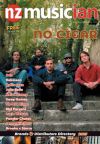Fresh Talent: Mads Harrop
Fresh Talent: Mads Harrop
With lyrical and vocal honesty to the fore, Mads Harrop merges emotional vulnerability with a sharp, rock-driven guitar tone in her music, prominent in her recently released single Hiding In Colour. Citing the likes of AK79 and 1970’s punk as inspiration, her tracks ring out with the infectiously simple energy of classic punk. She talks to Charlotte Lovrin about her songwriting process and the meaning behind her songs.
Since her first 3-song release in 2020, ‘Contagious’, Harrop’s musical progress has been confident and steady. In her fourth year studying a Bachelor of Music at the University of Otago, Harrop has teamed with a group of like-minded musicians with whom she is currently writing. As well as recording plans she also has some gigs lined up for the near future – an exciting prospect for Harrop and her band to showcase the new material in a live setting.
Songwriting is a process in which Harrop feels comfortable collaborating, encouraging her band to find their own ways of working within the music through improvisation.
“Definitely one of the other things that I really love about being a musician is working with other musicians. I encourage them to improvise with their own part – I think it sounds really interesting. Improvisation works!”
Harrop is neurodivergent, with autism, anxiety and Tourette syndrome (she was diagnosed with Tourette’s in her first year of university). She describes her songwriting as coming from a very personal place, with a significant emphasis on lyrics and personal experience.
“And when I’m feeling dark and blue, that’s when I need my medicine,” she recites in a b-side song plainly titled Medicine.
In Lost For Words, an as-yet-unreleased track, Harrop took inspiration from a particularly distressing interaction between herself and a bus driver.
“I was about to go on the bus back to uni. I was just lining up and getting ready to hop on the bus and then all of a sudden I started getting the swearing tic. The bus driver heard me and didn’t know I had Tourette’s until I told him. At first his reaction was that he got a bit annoyed. I then had a similar experience to that when I came home from uni a week later. The weekend when I came home after what had happened, I was completely heartbroken about it. I can remember the exact moment when I wrote the song. I was very emotional. I went to my room and picked my guitar up and literally, a couple of hours later, the song was born.”
This ability to transform painful experiences into raw and honest accounts through creating songs is a process Harrop finds greatly rewarding.
“Songwriting, for me, has just been my lifeline. Especially these past few years with my Tourette’s and things. It’s just been a huge huge help because it’s enabled me to communicate my emotions in a fun and creative way. The most amazing thing about songwriting is, with songs, you can turn horrible experiences you’ve had into songs that people will enjoy and resonate with.”


